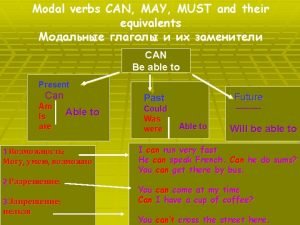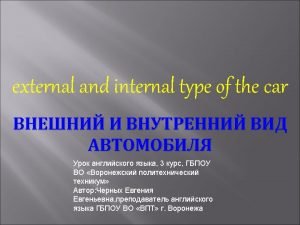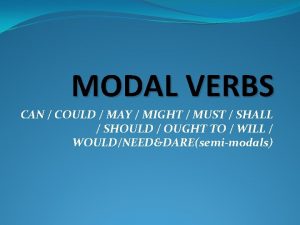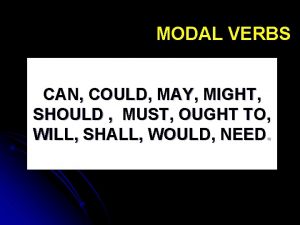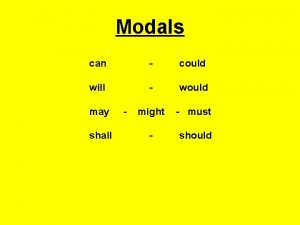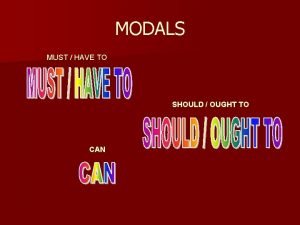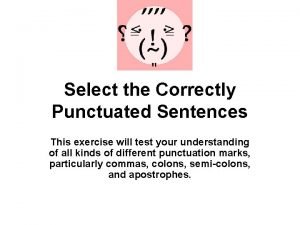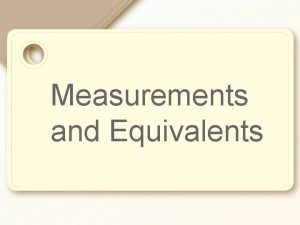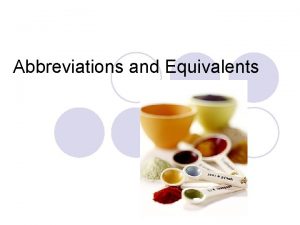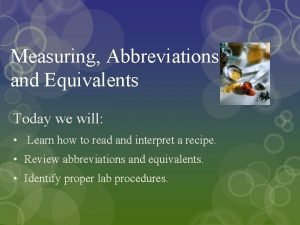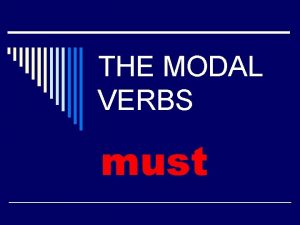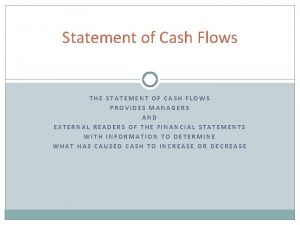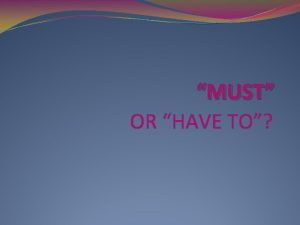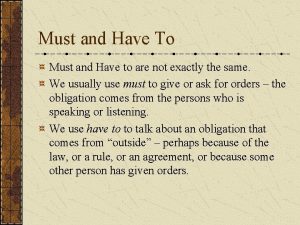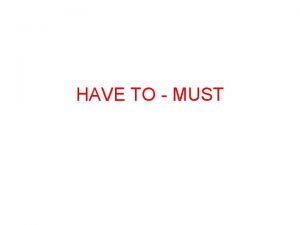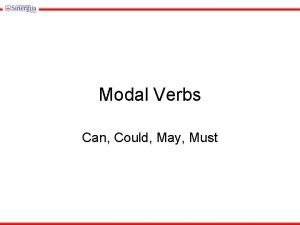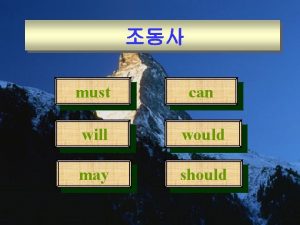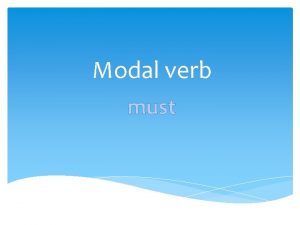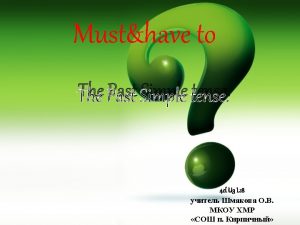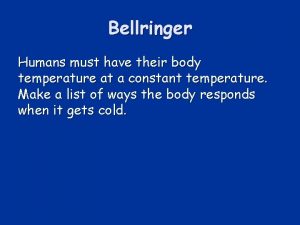and their equivalents Can may must have to





















- Slides: 21

and their equivalents Can, may, must, have to, be to, should, shall ought to, need

Can you? Can you hop like a rabbit? Can you jump like a frog? Can you walk like a duck? Can you run like a dog? Can you fly like a bird? Can you swim like a fish? And be still like a good child, As still as you wish?

*** Humpty-Dumpty sat on a wall, Humpty-Dumpty had a great fall. All the King’s horses, And all the King’s men, Couldn’t put Humpty together again. *** A man can do no more then he can. *** Child must first creep, then go.

Modal verbs CAN and their equivalents CAN Be able to Present Can Am Is are Able to 1 Возможность: Могу, умею, возможно 2 Разрешение: 3 Запрещение: нельзя Past Could Was were Able to Future Will be able to I can run very fast He can speak French. Can he do sums? Can I have a cup of coffee? You can’t cross the street here.


Modal verbs MAY and their equivalents MAY Be allow to Present May Am Is Allowed to are Past Future Might Was Allowed to were Will be allowed to… 1 Разрешение: Можно, разрешается May I come in? Yes you can (may). No, you can’t (may not) 2 Строгое запрещение: Не смей You may not leave the room until I say so. 3 Возможность: (воз) можно You may often see such faces in the South of Russia


Modal verbs MUST and their equivalents Must have to Present Past Future Must - - must have/has to. . . had to. . . will have to. . . am/is/are to. . . was/were to. . . 1. долг, обязательство: I must buy some bread. должен 2. приказ, We must study hard. настоятельный You must go there at once. совет: должен You must see the doctor immediately. 3. запрещение: You mustn't smoke here.


- «следует» If you want to give somebody advice, you can use “should”. You should go in for sports to be healthy. You should sleep enough to be healthy. You should be friendly to be healthy.

- «не следует» If your advice is negative, you can use “shouldn’t”. You shouldn’t smoke to be healthy. You shouldn’t eat unhealthy food. You shouldn’t work on the computer too long to be healthy.

If you want to ask for advice, you can put the word “should” at the beginning of your question: - Should I consult the doctor? Pay your attention to the possible answers: -Yes, you should. -No, you shouldn’t.

1) You _______ should get up early and go to bed early. _______ eat too much or too little. 2) You shouldn’t 3) You 4) You 5) You 6) You 7) You 8) You shouldn’t _______ watch TV too much. _______ should eat vitamins. shouldn’t _______ eat between meals. _______ should take regular exercises. _______ should take a cold shower. shouldn’t _______ go to bed late. Well done!!!


Для образования отрицательной и вопросительной формы с глаголом have to употребляются вспомогательный глагол do/does/did: - Why do you have to go to the dentist every three months? (not: «Have I to do) - Did you have to go to school yesterday? (not: «Had you to go)

To have to в вопросительных и отрицательных предложениях в значении долженствования Present I have to get up early. Yes, I do. Do you have to get up early. He has to get up early. Yes, he does. Does he have to get up early? No, I don’t have to get up early. Past He had to get up early. Did he have to get up early? Yes, he did. No, he didn’t. He didn’t have to get up early. Future He’ll get up early. Will he have to get up early? Yes, he will. No, I won’t. He won’t have to get up early. No, he doesn’t. He doesn’t have to get up early.





 Can may must have to
Can may must have to Ejercicios con should y could
Ejercicios con should y could Match the dog idioms with their russian equivalents
Match the dog idioms with their russian equivalents 1 listen and repeat
1 listen and repeat Shall should can could may might
Shall should can could may might May might must
May might must Can, could, will, would
Can, could, will, would Have to must should ought to
Have to must should ought to Select the correctly punctuated sentence
Select the correctly punctuated sentence Measurements equivalents and adjustments
Measurements equivalents and adjustments Abbreviations for pint
Abbreviations for pint Teaspoon abbreviation
Teaspoon abbreviation Muses domain
Muses domain The king of the greek gods
The king of the greek gods It has 6 rectangular faces 8 corners and 12 edges
It has 6 rectangular faces 8 corners and 12 edges Draw an arrow from the pronoun to its antecedent
Draw an arrow from the pronoun to its antecedent He must become greater; i must become less
He must become greater; i must become less Reducing equivalents
Reducing equivalents Reducing equivalents
Reducing equivalents Modal verbs equivalents
Modal verbs equivalents Cash equivalents examples
Cash equivalents examples Ssri side effect chart
Ssri side effect chart
